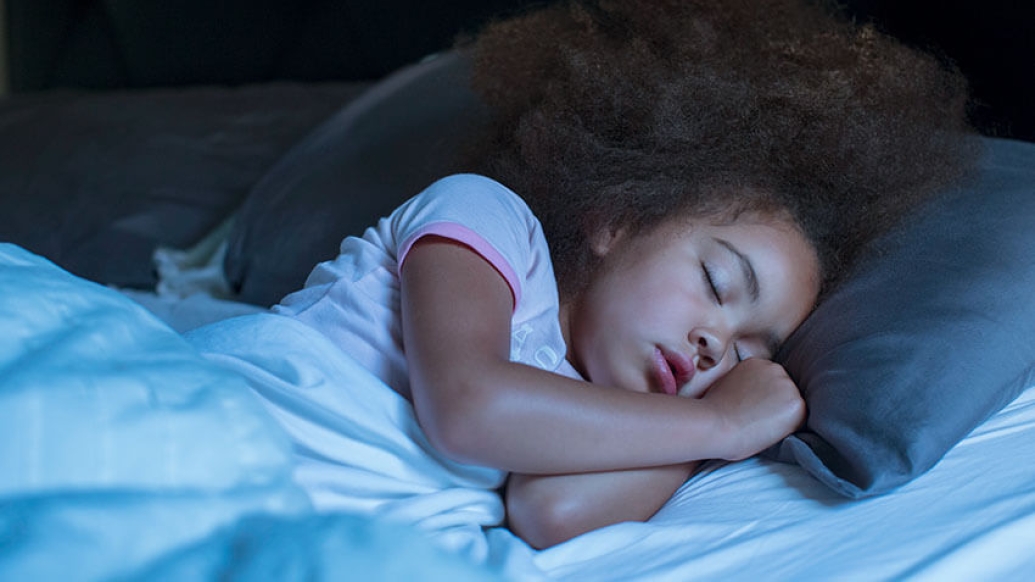Without an alarm clock set for school, sleep routines are anything but routine right now in many homes. A sleep psychologist shares what parents should know.
12:50 PM
Author |

Editor's note: Information on the COVID-19 crisis is constantly changing. For the latest numbers and updates, keep checking the CDC's website. For the most up-to-date information from Michigan Medicine, visit the hospital's Coronavirus (COVID-19) webpage.
Interested in a COVID-19 clinical trial? Health research is critical to ending the COVID-19 pandemic. Our researchers are hard at work to find vaccines and other ways to potentially prevent and treat the disease and need your help. Sign up to be considered for a clinical trial at Michigan Medicine.
While kids are watching their parents worry about the current pandemic and ongoing protests, many haven't played outside with their friends yet even though school's out, and they're taking note of people wearing masks around their neighborhood. They know something is up, and some may have trouble sleeping because of it.
Dawn Dore-Stites, Ph.D., a pediatric sleep psychologist at C.S. Mott Children's Hospital and Michigan Medicine's Sleep Disorders Centers, says she's seeing current events affect the sleep of entire families in her virtual clinic.
And because of this widespread stress and sleep disruption, Dore-Stites is actually relaxing her advice to parents right now. Even if some best habits she would normally teach are slipping, there will be time to correct them, she says.
MORE FROM MICHIGAN: Sign up for our weekly newsletter
"This is an unprecedented time and we've all got to be nice to ourselves," she says. "I really worry about putting this undue pressure on parents right now as they're trying to manage so much, when bedtime can already be the roughest part of the day in normal situations."
She tells her patients that a few small things can make a big difference in sleep quality right now.
Focusing on regularity and duration
Dore-Stites says parents shouldn't stress themselves out more by trying to keep the whole house on their typical sleep schedule if that's not realistic right now.
SEE ALSO: Seeking Medical Care During COVID-19
"Kids don't have school to anchor them during the day, so they're going to bed later and getting up later," she says.
Pushing back sleep and wake times is great for teenagers, because it puts them more in line with their circadian rhythm, Dore-Stites says. But in homes with younger children, Dore-Stites is seeing many parents simply don't have the energy reserves at the end of the day to maintain a strict bedtime.
I really worry about putting this undue pressure on parents right now as they're trying to manage so much, when bedtime can already be the roughest part of the day in normal situations.Dawn Dore-Stites, Ph.D.
"I'm taking a pragmatic approach," she explains. "Come August, provided school is about to be back in session, we can talk about how to shift schedules for the long term. We'll be able to anticipate going back to school with enough time to avoid an abrupt adjustment.
While things feel a little all over the place, Dore-Stites says it's best to prioritize regularity and duration. That means your child should be sleeping for a sufficient duration of time every night, so if they are up a little later than their normal bedtime, that's OK, but then don't wake them up early the next morning.
"I emphasize having a regular schedule, even if not timed the way you'd normally have it," she says about regularity. So whether your elementary schooler is staying up until 10 right now or dozing off by 8 p.m., try to keep those sleep and wake times as consistent as you can throughout the summer.
Addressing anxiety through routine
Dore-Stites says some of her pediatric patients are picking up on the stress and anxiety plaguing many adults right now, and really struggling to fall asleep or stay asleep. And a few might also want to start crawling back into their parents' bed in the middle of the night because they're scared.
"These are the kids I worry about a little bit more, and I may be more aggressive about encouraging strong routines in the home," she says. "Routines send a message to kids that things are going to be OK."
SEE ALSO: Despite Health and Learning Benefits, Half of Parents Against Later School Start Times
She also recommends keeping the child busy throughout the day with activities and distractions and light exposure, so they're starting the evening in the best place to be able to calmly go to sleep.
"If your child reaches a threshold where it's taking multiple hours to go to sleep or they're panicked and tearful, I would encourage families to reach out to their pediatrician or behavioral health provider," Dore-Stites says, to help find coping strategies that work for the child.
But if your children are needing more contact with you because of their anxiety, "do what you need to do as a parent right now, and we can correct it later," she urges. For some, that may mean allowing a bit of co-sleeping if they wake in the middle of the night, or for others it could be taking children back to their bed during these times but staying present to provide some reassurance.
And if movie night is something that you need for peace and quiet from time to time, Dore-Stites says to just limit the evening screen time to a weekly tradition (rather than nightly) and pick something less stimulating that won't get your kids riled up before bed.
SEE ALSO: 10 Tips to Help Your Teen Sleep Better
"I think we need to give ourselves permission to be kind to ourselves and to our kids while we get through this."
Approaching the news thoughtfully
Dore-Stites says, like most of us, she gets a little worried about disconnecting from the news for too long; situations change hourly right now. But she encourages all of us to at least turn the broadcast off or log off of our devices before bed. That's the worst time to get caught up in a stressful story.
SEE ALSO: Keeping Our Patients Safe During COVID-19
And while Dore-Stites avoids watching the news with her own children during unpredictable times, that doesn't mean pretending like nothing is happening.
"Parents can deliver the information and acknowledge, 'I'm scared, too,' or 'I'm stressed, too,' and demonstrate healthy ways to respond to anxiety, such as going for a walk or a bike ride," she says. "We want to convey to our children that they are safe and explain what's happening in a developmentally appropriate way, but that's difficult for parents to do in real time while managing our own emotions as viewers during a news broadcast."
Like Podcasts? Add the Michigan Medicine News Break to your Alexa-enabled device or subscribe for daily updates on iTunes, Google Play and Stitcher.

Explore a variety of health care news & stories by visiting the Health Lab home page for more articles.

Department of Communication at Michigan Medicine
Want top health & research news weekly? Sign up for Health Lab’s newsletters today!





